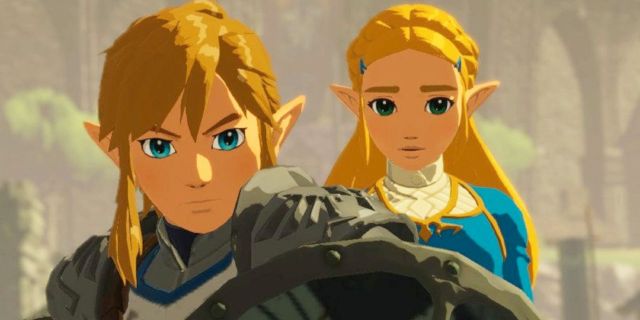Highlights
- Link may be the hero, but Princess Zelda is the true heart of Hyrule, sacrificing herself for the greater good.
- Zelda’s character is complex – she fights battles in the political and spiritual realm, showcasing her bravery and intellect.
- Naming conventions aside, getting Zelda’s portrayal right is crucial for the success and authenticity of a Legend of Zelda movie.
For almost forty years, The Legend of Zelda games have been a paragon of Nintendo’s commitment to creating fun, innovative, and engaging adventures for players of all ages. Generations of adventure seekers have gotten lost in the realms of Hyrule. With the heroic Link as their avatar, gamers fight against the forces of evil to defeat Ganondorf and bring peace to the kingdom.
Given the audience’s attachment to Link as their entry point into the magical world of Hyrule, it only makes sense that the announcement of a live-action The Legend of Zelda movie would garner strong opinions on how to best adapt the hero of time to the big screen. However, there is one character that is so crucial to the games that if the movie doesn’t get them right, the overall success of a film series will be in question — that is Princess Zelda herself.
Princess Zelda is More Than A Damsel

Link makes for an excellent audience avatar because he is such a blank slate. He is a man of action, opting to keep his dialogue to a minimum. Fans know him as a stalwart hero, a brave adventurer who forgoes glory, instead driven by a sense of right and wrong. While adapting him to a more confined and linear narrative, like film, won’t be easy, as long as Link remains a traditional hero, fans of the series should be happy. Getting Zelda right is much trickier.
At first glance, one might only think of Princess Zelda as nothing more than the average “video game damsel in distress.” After all, aren’t the majority of The Legend of Zelda about the male hero rescuing the princess? While this is an understandable misconception, it does prove to be a fundamental lack of understanding of the character. Oftentimes, while Link is battling monsters with his magic sword, the princess is using her own powers and being a diplomat, fighting a political and spiritual battle that requires a sharp mind, a brave heart, and an unlimited supply of patience.
When Princess Zelda needs to be rescued, it is either part of a larger strategy, or a destiny she cannot avoid. She and Link are connected by a heroic cycle, saving the world only to be reborn when evil rises again. Just as it is Link’s fate to hack, slash, and puzzle-solve his way to victory, Zelda must sacrifice herself for the greater good to see that light prevail. That is a heavy burden to carry and an element of the character that sets her apart from other, more simplistic, depictions of princesses in fantasy.
Princess Zelda is The Heart of Hyrule

Hyrule is both a wonderful and dangerous place, full of magic and monstrous enemies. For those who wish to escape to a world where the lines between good and evil are so clearly drawn, where many problems can be solved with the sharp end of a blade, life-or-death encounters are part of the thrill. If the world is going to feel like an actual place with real people, though, there needs to be a sense that love and kindness can thrive as well. That is where Princess Zelda comes in.
As mentioned above, Zelda is destined to keep evil at bay through all of her reincarnations. She and Link must fight this unending war against Ganon and the forces of darkness until the end of time. This doesn’t mean that she is purely motivated by destiny, however. Zelda could not manifest the strength to stand against all that is cruel and corrupt without a willingness to care about the people she is protecting.
In that way, she is the heart of Hyrule, the essence of innocence and selflessness. Unlike most monarchs, she doesn’t lead her people through demands or decrees. She leads by example, doing the right thing when survival seems impossible, putting herself in harm’s way when people are threatened, and making sure Link knows how deeply he is appreciated. It is her influence that makes Hyrule a place worth living in.
Why the Series is Called The Legend of Zelda

Assume, for a moment, that now everyone going to see a movie called The Legend of Zelda knows who Link is. The average moviegoer may have a passing familiarity with the source material, but someone who has never played the games might assume that the hero killing all the baddies with a cool sword is Zelda. It makes sense.
Therefore, imagine their confusion when characters start referring to the protagonist as Link. They may wonder, “What’s so special about this guy? I thought this was supposed to be about someone named Zelda.” While not a huge problem, the filmmakers may want to avoid any confusion by making it clear that Link is our introduction to the world, while Zelda is the one behind the scenes, making decisions that will either see Link succeed, or result in darkness consuming Hyrule.
Titles are just titles at the end of the day. It doesn’t really matter what something is called if the story is compelling enough to keep people watching. That being said, if a series is going to be named after one of the characters, it should probably give people a reason to care about that person. By getting Zelda’s character right, the filmmakers would be honoring the fans of the games, giving audiences an interesting and complex character, and erasing any doubt in the minds of the masses that these films deserve to be called The Legend of Zelda











Leave a Reply